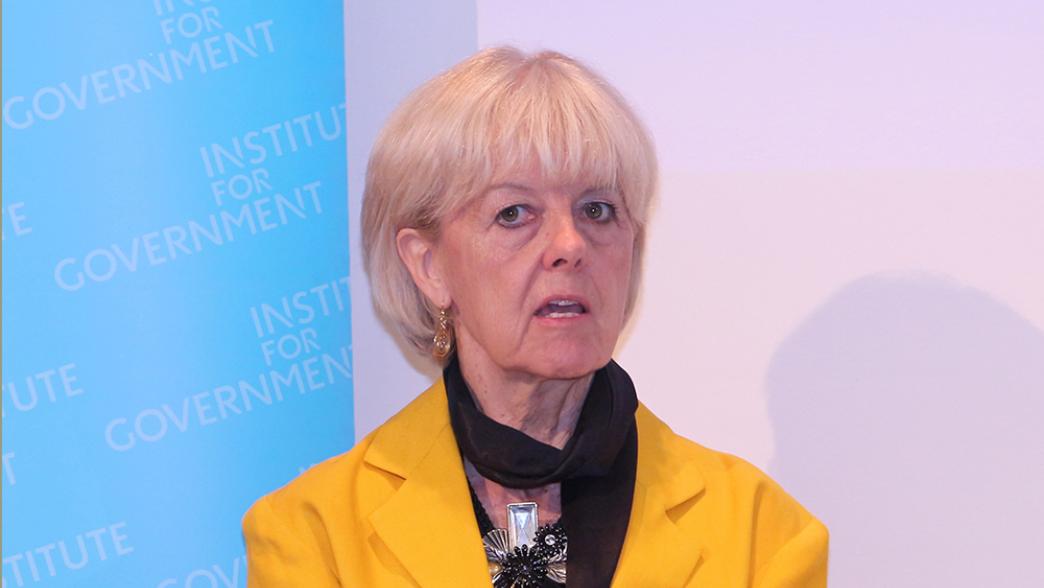
The Repeal Bill is the centrepiece of the Government’s legislative agenda for Brexit. Marcus Shepheard considers how the uncertainty it creates can be managed with smart drafting and effective scrutiny.
The Repeal Bill will be the most potent piece of legislation that has passed through Parliament in decades. It is the job of Parliament to see that the Government focuses on delivering the most direct transposition of legislation.
The Institute for Government (IfG) hosted a discussion about the key aspects of the Repeal Bill and how it might pass through Parliament. The panel included Baroness Hayter (Shadow Minister for Exiting the European Union, House of Lords), Sir Stephen Laws QC (former First Parliamentary Counsel), Dr Ruth Fox (Director and Head of Research at the Hansard Society) and Akash Paun (Fellow at the Institute for Government).

Panellists left to right: Sir Stephen Laws QC, Baroness Hayter, Jill Rutter, Dr Ruth Fox and Akash Paun.
Through these discussions, we identified four elements of the bill that could decide whether it succeeds or fails: its objectives, the transfer of powers and responsibilities it outlines, the role of Parliament and finally the role of devolved governments.
“Changing a system in order to produce whatever result changing the system produces”
The Repeal Bill will require wide powers, but their specific uses remain unclear. Sir Stephen Laws likens the process to mapping a route from New York to the Pacific: it is much easier to know where you’re going if you know your destination is Los Angeles.
Uncertainty about the final destination of this bill creates difficulties for those drafting it. The key function of the bill is “to provide for continuity” and Sir Stephen would approach this task with a broad view of what continuity means before getting into the detail and moulding the bill into its final shape.
Sir Stephen believes it is critical that this process separates continuity from new policy, which will be specified in other Brexit bills. Safeguards such as sunset clauses and limitations on powers should also be included on the face of the bill.
“Lifting and shifting”, a badly named bill and the need for “nasty little questions”
Calling the Repeal bill “a misnomer”, Baroness Hayter said this will not be “a simple cut and paste exercise” and some areas of the law – such as human rights and competition policy – are too important and complex to be carried over in a straightforward fashion.
Ensuring that the Government “will do as it has promised” is a priority for the Opposition, who will be pursuing dogged and “nasty” questions that the Government cannot avoid. Equally, the Opposition will try to ensure that changes to transposed legislation does not favour the policy objectives of the Government in a way that could “water down the bill”, particularly in areas such as workers’ rights which had a prominent position in the recent Labour Party manifesto. This means scrutinising changes to the imported text of the acquis to ensure neutrality.
Baroness Hayter highlighted the challenge facing the public bodies and other institutions that will have to step into the gaps left by EU institutions. Many of these bodies will face sudden and significant changes in the way they operate and the scope of what they are required to deliver.
“Can the House of Commons live up to its democratic responsibility?”
Dr Ruth Fox stressed that scrutiny of the bill and its powers will be a challenge for Parliament. This is an unusual and complex piece of legislation and many of the 87 new MPs “are frankly going to be all at sea” trying to scrutinise this as their first piece of legislation and make sense of how the bill treats delegated powers.
The challenge for Parliament is exacerbated by the status of the select committees, which may not be fully filled and operational until sometime this September. These committees will be expected to bear much of the load of scrutiny and the sooner they can get to work the better.
The Repeal Bill offers Parliament an opportunity to improve how legislation is scrutinised. Drawing on the expertise of the House of Lords Delegated Powers and Regulatory Reform Committee is one way the Repeal Bill could be better scrutinised.
Sir Stephen Laws believes that scrutiny should take two forms. A system of “triage” is needed to cut through the sheer size of the bill to identify the areas that need the most direct scrutiny, either by committees or Parliament itself. The remainder of the bill could be scrutinised by random sampling, to deter policy-driven tinkering.
“The UK Government has over-promised and under-delivered with respect to the devolved administrations”
Akash Paun said the Sewel Convention implied that Westminster may need the consent of the devolved administrations if the Repeal Bill repatriates previously-devolved powers, such as those in agriculture. But the Government has not fostered a good relationship with the devolved administrations over Brexit, none of whom saw the Article 50 letter or the “Great” Repeal Bill white paper before they were published.
The onus is on the Government to mend fences through careful negotiation with the devolved administrations to rebuild trust.
The current model is that “no decisions currently made at the devolved level will be taken away from them”. Finding agreement on this will be tricky as the different governments are “coming at this from quite a different constitutional understanding”.
Passing the Repeal Bill
In the months and years after its passage it will fall to Parliament to act decisively as the custodian of this bill, scrutinising any changes made to it.
From what we heard at the IfG discussion, the more inclusive this process can be - and that means drawing in MPs from across parties and members of the devolved governments - the more successful this bill will be in the long term.
Watch and listen to the event Legislating Brexit: Prospects for the Repeal Bill on our events page.